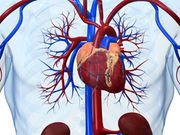Similar findings among individuals with diabetes able to achieve normoglycemia
MONDAY, Sept. 25, 2017 (HealthDay News) — Cardiovascular outcomes in patients with diabetes are not explained by insulin resistance, according to research published online Sept. 12 in Diabetes, Obesity and Metabolism.
Hertzel C. Gerstein, M.D., from McMaster University in Hamilton, Canada, and colleagues conducted secondary analyses of participants allocated to insulin glargine, who added it to lifestyle or one glucose lowering oral agent at randomization. Calculations included the median of the natural logarithm of the insulin doses (expressed per kilogram of fat-free mass) from every visit from randomization until either the penultimate visit or the first occurrence of a cardiovascular outcome.
The researchers found that higher median insulin doses did not reflect incident cardiovascular events overall or in the subset that achieved normoglycemia. The adjusted hazard of the composite of cardiovascular death, myocardial infarction, or stroke was 0.94 (95 percent confidence interval, 0.88 to 1.00) per unit higher dose overall, and 0.91 (95 percent confidence interval, 0.81 to 1.01) in the normoglycemic subset, when examining the dose taken before a cardiovascular event or the penultimate visit.
“Insulin resistance may not promote cardiovascular outcomes in people with dysglycemia,” the authors write.
Several authors disclosed financial ties to pharmaceutical companies, including Sanofi, which funded the study.
Copyright © 2017 HealthDay. All rights reserved.








